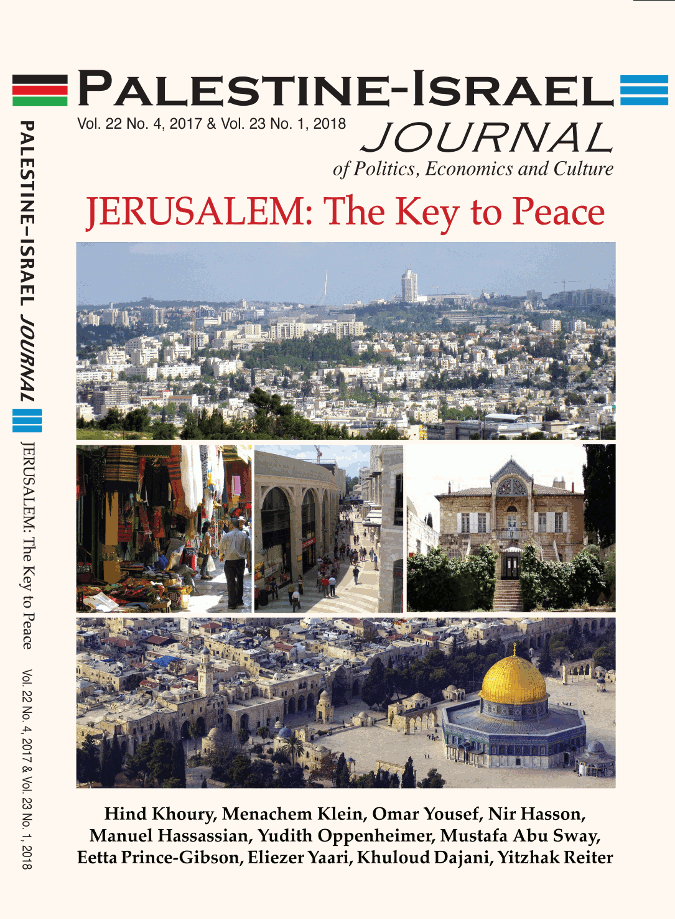At the last moment when this issue was ready to go to the printer, U.S. President Donald Trump came out with his statement officially recognizing Jerusalem as the capital of the State of Israel and instructing the U.S. State Department to move the embassy from Tel Aviv to Jerusalem. The statement will have a far-reaching impact on efforts to achieve a political settlement between the Israelis and the Palestinians, and therefore requires a clear, immediate response before it’s too late. President Trump’s decision lacks any international legitimacy or legal justification.
First, this statement is in full violation of the United NationsGeneral Assembly Resolution 181(known as thePartition Plan) of November 1947, and all relevant UNSecurity Council resolutions on Jerusalem since it was occupied by Israel in June 1967. Numerous UNSC resolutions have said in the clearest language that Jerusalem is an occupied area, that all Israeli measures taken in the city are null and void.
UNSC Resolution 252 (1968) in particular is explicit in this regard. In it, the Council considered “that all legislative and administrative measures and actions taken by Israel, including expropriation of land and properties thereon, which tend to change the legal status of Jerusalem, are invalid and cannot change that status.” Israel was urgently called upon “to rescind all such measures already taken and to desist forthwith from taking any further action which tends to change the status of Jerusalem.” The Security Council has repeatedly reaffirmed these two positions.
The applicability of the Fourth Geneva Convention to Jerusalem was reaffirmed by the Security Council on December 20, 1990, when it expressed grave concern over the deteriorating situation in “all the Palestinian territories occupied by Israel since 1967, including Jerusalem,” and called on Israel to abide by it. Since 1997, the 10themergency special session of the General Assembly has been reconvened several times. At the emergency session held in February 1999, the General Assembly affirmed its support for the Middle East peace process on the basis of the relevant Security Council resolutions and the principle of land for peace. Recalling its relevant resolutions, including Resolution 181 and those of the Security Council, the General Assembly reaffirmed that the international community, through the United Nations, has a legitimate interest in the question of the city of Jerusalem and the protection of its unique spiritual and religious dimension. It further reaffirmed the continued invalidity of all actions taken by Israel, the occupying power that have altered, or purported to have altered, the character, legal status and demographic composition of Jerusalem. Furthermore, UNGA Resolution 181 of November 1947 gave Jerusalem a special “corpus separatum” status and this status is still binding, and no country in the world recognized the Israel occupation of Jerusalem or chose to move its embassy from Tel Aviv to Jerusalem, as such a step would have been interpreted as recognition of the Israeli sovereignty over Jerusalem.
Having said this, it’s worth adding that Trump’s statement came 100 years after Lord Balfour’s promise to establish a Jewish homeland in Palestine. Both Balfour and Trump gave away what they didn’t own.
President Trump introduced his decision as an effort to make an unprecedented act to advance the peace process. Yet he did not present a strategic comprehensive plan to end the Israeli occupation and resolve the conflict.He failed when he spoke about Jerusalem as the capital of Israel and made no clear mention of the Palestinians’ national right to Jerusalem, whereas everybody knows that without East Jerusalem as the capital of the State of Palestine,no Palestinian will subscribe to peace with Israel.President Trump expressed his support for the two-state solution, but he restricted that support by saying, “if the parties want it,” and with this qualification,he left the issue in the hands of the right-wing Israeli government, which has no intention to move toward a solution ending the 50-year occupation of the Occupied Palestinian Territories, including East Jerusalem.
Finally, President Trump’s statement was a zigzag public relations statement to satisfy the right-wing Jewish lobby in the United States, mainly AIPAC, and the extreme evangelical Christians, who are boosters ofIsrael. Israel,which already has the upper hand as the occupier,is now further strengthened by this statement,which will be interpreted by the Israeli right as full American support of their lack of will to end the occupation and settlements expansion policy.
Noticeably, President Trump did not say clearly what he meant by “Jerusalem” but said that his statement didn’t define the borders of Israeli sovereignty in Jerusalem,and that it would not affect the outcome of the negotiations on the final status issues which include Jerusalem, or change the status quo in the holy places of Jews, Christians, and Muslims. These vague sentences are not more than lip service in an attempt to calm the expected Arab and Muslim outrage against his decision.
To conclude, I would say that President Trump’s announcement on Jerusalem, if not followed by an intensive, serious effort on the part of the U.S. to change the attitude and policy of Israel vis-à-vis the occupied territories, will only open the door wider to making the current situation permanent. The current situation is heading toward an apartheid regime, with about six million Palestinians under the rule of Israel as sub-citizens. This situation cannot last forever and will end sooner or later with the creation of one state for all its citizens — the one-state solution—and the end of the Zionist dream of having a Jewish state. Until we are there, we can expect that along period of violence and bloodshed will be the future fate of this miserable area, of the Holy Land which lacks peace and lacks justice for its people.

